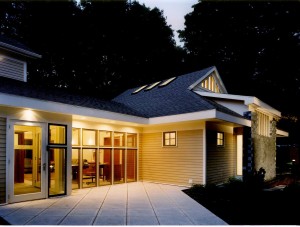by Lisa Berman, Mikveh and Education Director
When we talk about Mayyim Hayyim, we often focus on the moments at our mikveh that are celebratory. Joyful gatherings of people who usher into our space an atmosphere of conviviality and festivity — conversions, brides and grooms, bar and bat mitzvah kids, birthday celebrants.
Just last week we watched our sunlit “celebration space,” also known as the education center and art gallery, transform into a beautiful luncheon celebration for 20 friends and family of a gentleman converting, completing his life long journey to Judaism. Platters of food, centerpieces, table cloths – all the trappings the gala deserved.
The guests milled about, socializing, as a completely different group began to gather for the next celebration of a young woman also converting. Toddlers pulled up on the furniture, parents browsed our children’s book collection, tours were given, questions answered, hugs exchanged by far flung relatives. Purses and tote bags were scattered about, joined by cups and plates, baby bottles and burp cloths, and the hubbub segued into loud choruses of congratulation, wishing, “mazel tov!” and “siman tov u’mazel tov!”
As these wonderful groups trickle out the door, murmuring “Thank you, thank you; sorry for the mess, sorry for the noise,” I often reply, “No, thank you — it would be very boring at Mayyim Hayyim without families and friends like yours bringing joy-filled tumult to our space.”
The echoes of these celebrations diminish gradually throughout the day, and as evening settles in, the building takes on a completely different atmosphere – serene, softly lit, hushed, embracing. We welcome our evening guests with soft voices, “Hello, how have you been, are you ready to get ready?” We tread gently as we show them to preparation rooms and latch the door with restraint. Our mikveh guides nurse cups of tea and read or knit as they wait to witness immersions. Smiling slightly, they quietly say, “kasher” as women slide softly beneath the warm water again. The lights reflecting off the Jerusalem gold tiles of the mikveh walls and floor fill the room with an enveloping glow. Even the water seems to lap tenderly as women exit the pools lightly. Doors are held open for exiting guests, “Take care, get home safely.”
And then, when everyone else has left, we tuck in the mikveh. We place covers on the pools, place a neat stack of clean linens in each room, wipe dry the laminated ceremonies that guests have selected, noting the poignant nature of some that calm faces belied. We empty the hampers, stow toiletries in the medicine cabinets, close the shower curtains. We go from room to room, extinguishing the more than 30 light switches on the first floor, darkening the space little by little by little until, outside, only the lights shining up from the cistern and down from the trees guide us on the path through the garden, up to our gate and on our way home.
Lisa Berman is the Mikveh and Education Director at Mayyim Hayyim. She began as a volunteer mikveh guide the day Mayyim Hayyim opened its doors in 2004 and now directs a Center that educates more than 2500 people each year about this ancient ritual and its contemporary possibilities.

